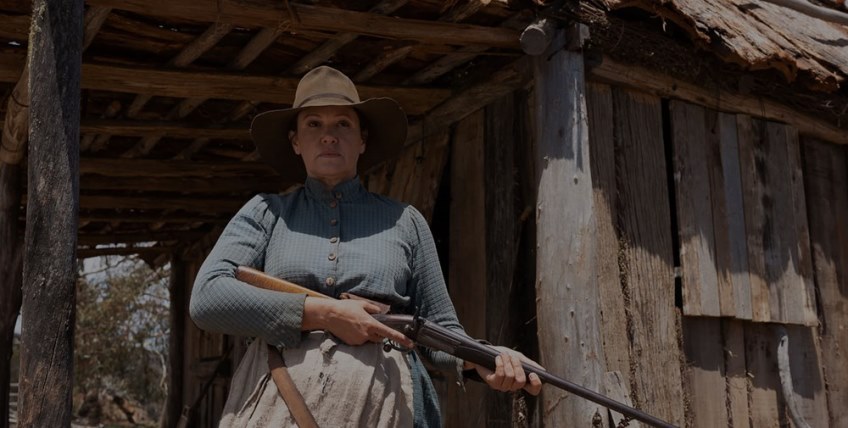Joyce Glasser reviews The Drover’s Wife: The Legend of Molly Johnson (May 13, 2022) Cert 15, 108 mins.
Australia boasts this year’s Academy Award winning director Jane Campion, Academy Award winning actors Russell Crowe and Cate Blanchett and miles of studios used in international blockbusters. But there is also a wealth of Indigenous talent under the surface of Britain’s former penal colony that has only just started to erupt. We already had a powerful taste in Kaytetye Warwick Thornton’s Samson and Delilah, which won the Camera D’Or at the 2009 Cannes Film Festival, followed, in 2017 by the even more ambitious and equally riveting revisionist Australian western, Sweet Country which won the Special Jury Prize at the Venice Film Festival.
Now there is a new, Indigenous powerhouse to reckon with in playwright, novelist, actor, activist and screenwriter Leah Purcell’s directorial debut, The Drover’s Wife The Legend of Molly Johnson. Purcell is a Goa-Gungarri-Wakka Wakka Murri woman from Queensland, and it’s not enough for her to provide a voice for Indigenous writer-directors: that voice is uncompromisingly, to a fault, feminist.
Purcell takes, as a starting point, Henry Lawson’s beloved short story from 1892 that she has already adapted for the stage. Though Lawson’s mother was a feminist, Purcell expands the story and every character and reference in it, changing, or rather reinterpreting the story almost beyond recognition. In Purcell’s hands, it becomes a state of the nation indictment of racism, misogyny and a celebration of cultural identity.

If you are breaking new ground in an overwhelmingly masculine, white, Western culture, why not go all the way and star in the film, too? Suffice it to say, Purcell is so convincing that if you didn’t know, you would never believe you are watching the writer-director and not a bush farmer’s wife, as comfortable with a rifle resting on her hip as with a baby.
While she tells people that her husband, the drover Joe Johnson, is off for long periods with his sheep, heavily pregnant Molly guards the rickety log cabin on the outskirts of the burgeoning township of Everton. There she lives a solitary and spartan existence with her four surviving children, the oldest being 12-year-old Danny (Malachi Dower-Robert), who, by necessity, is mature beyond his years.
No one is safe around the cabin, and when a stray bullock shows up and won’t leave, she shoots it and cooks the meat on an open pit outside as a treat for the children. But the arrival of a pair of strangers, attracted by the smell of meat, heralds a change where her solitude is invaded by a steady stream of visitors, most unwanted.
It takes a while for Molly to trust even the affable, handsome Sgt. Nate Clintoff (Sam Reid), who walks with a limp from a Boer war wound, and his pretty, London-bred bride, Louisa (Jessica De Gouw). Clintoff explains that they have travelled a long distance and got lost through calamity on his way to take up a job enforcing the law of the Crown in lawless Everton.
Louisa, an aspiring writer and early Feminist with an anachronistic interest in battered women, plans to start her own monthly journal for women in Everton. If Molly shows little interest in subscribing, we can sense an instant cultural divide springing, one up between the two women, one that narrows as the story progresses, but not as much as you think.
When Louisa, who has never been apart from Clintoff since they met, sympathises with the hardship of being pregnant and apart from the drover for so long, Molly suddenly waxes lyrical, staring into the far hills with a rare smile on her face. She describes a fairy tale homecoming in poetic language that seems unnatural.

In Everton, Clintoff is surrounded by racist, self-interested pillars of the community and a creepy young constable (Benedict Hardie) who helps him learn the territory. Clintoff finds himself pressured to get to work finding the Aboriginal killer of a powerful businessman’s wife, or so he is told.
It just so happens, in the increasingly violent twist and turns of this intricately plotted saga, that the prime suspect, looking as guilty as sin, is the next visitor to Molly’s cabin. In perhaps the most unexpected and astonishing scene in the film Molly is about to blow the man’s head off when she goes into labour and grabs the bewildered man’s outstretched hand….
After that traumatic experience, the stranger, Yadaka (Rob Collins) hangs around, out of compassion, but also self-interest. Molly expresses her gratitude by cutting the shackles from around his neck with a hatchet, and while she gives him a deadline, Yadaka still hangs around. The two strangers form a bond that turns out to be stronger than Molly could have suspected; one that goes to the core of her cultural identity.
There is nothing as obvious as a sexual relationship, but something more profound, when Yadaka’s stories about his Indigenous community and Molly’s parentage awaken in her a deep seeded, but still shocking, connection to her roots.
Meanwhile, Clintoff, who has begun searching for Joe Johnson, and not just for Molly’s benefit, sends his constable to Molly’s as part of the investigation. He is outraged to find Yadaka there, and Molly is unable to defend her new friend.
Their happy idyl is destroyed by a chain of increasingly disturbing events that expose the hypocrisy and systemic racism of the towns folk and the brutal treatment of women that Louisa hoped to combat.
Molly’s secret and Louisa’s urban, progressive crusade against battered women, is too schematic and it is hard to know what to make of Louisa’s pathetically ineffective activism, which does nothing to help Molly. And while the ending might be inevitable, you might wonder if frontier justice was, even circa 1893, so swift and medieval.
But Purcell and Collins are a refreshing pairing and make you care about them. And as a portrait of a single minded woman willing to sacrifice herself for her children’s freedom, the film operates on a visceral level, which will leave you shaking with moral outrage.




